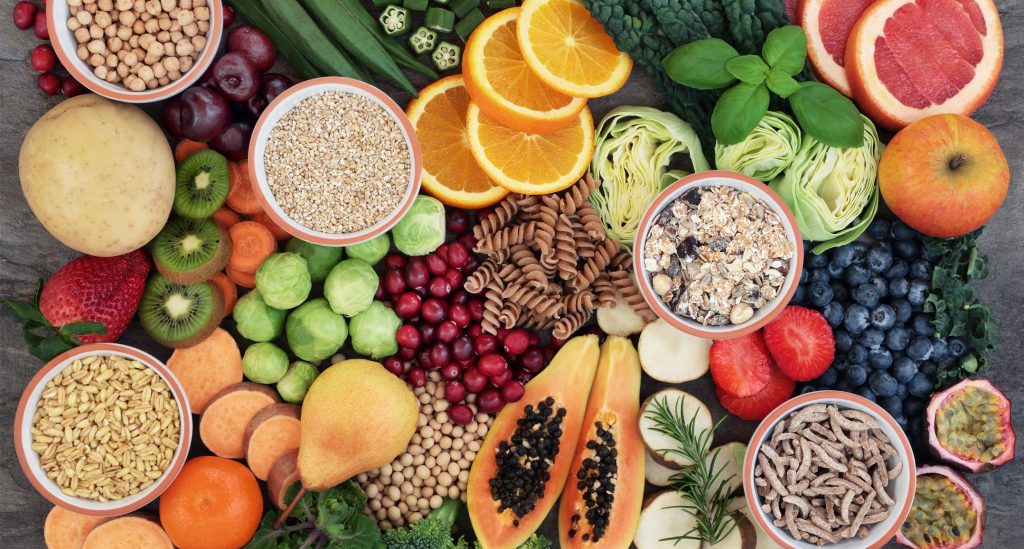The gut microbiota plays a crucial role in our overall health, with numerous studies linking imbalances in gut bacteria to various non-communicable diseases such as obesity, diabetes, cardiovascular diseases, and irritable bowel disease. Recent research has highlighted the importance of maintaining a diverse diet to promote a healthy gut microbiota composition. Among different diets, the Mediterranean diet stands out as the most beneficial for gut health due to its inclusion of foods that support a balanced gut microbiota.
A review published in the journal Nutrients by Rinninella and colleagues delves into how specific food components and additives impact the gut microbiota composition. Several key food components were identified as playing a significant role in maintaining a healthy gut microbiota:
1. Fiber: Prebiotics, a type of fiber, serve as food for beneficial bacteria in the gut, promoting the production of short-chain fatty acids like butyrate, which support intestinal barrier function and immune health.
2. Micronutrients: While the gut microbiota can synthesize certain vitamins, additional micronutrients from the diet can influence its composition. For example, vitamin D has been shown to increase beneficial bacteria like Lactobacillus, which can have a positive impact on immune function.
3. Polyphenols: Found in many plant foods, polyphenols promote the growth of beneficial bacteria and exhibit prebiotic activity. These compounds can also be metabolized by gut bacteria, enhancing their health benefits.
4. Essential fatty acids: Omega-3 fatty acids, primarily found in fatty fish, can increase levels of beneficial bacteria that produce anti-inflammatory compounds. Meanwhile, omega-9 fatty acids, like those found in extra virgin olive oil, can impact the balance of specific bacterial genera.
In conclusion, maintaining a diet rich in fiber, fruits, and vegetables is essential for promoting a healthy gut microbiota composition. Avoiding a Western diet high in sugar, fat, and additives is crucial to prevent a decrease in beneficial bacteria that can lead to intestinal issues and inflammation. The Mediterranean diet, with its balanced approach and inclusion of diverse food groups, emerges as the optimal choice for supporting gut health. Rather than focusing on single nutrients, prioritizing a varied diet rich in fiber and nutrients is key to maintaining a healthy gut microbiota and overall well-being. In the future, personalized nutrition based on microbiome analysis could revolutionize how we approach gut health and dietary choices.
Reference: Rinninella E. et al. Food components and dietary habits: Keys for a healthy gut microbiota composition. Nutrients; 2019: 11, 2393; doi:10.3390/nu11102393. the topic of the impact of social media on mental health
Social media has become an integral part of our daily lives, with millions of people around the world using platforms like Facebook, Instagram, Twitter, and TikTok to connect with friends, family, and strangers. While social media can be a powerful tool for communication and networking, it also has a dark side that can have a significant impact on mental health.
One of the most damaging aspects of social media is the pressure to maintain a perfect image. Many users carefully curate their profiles to showcase only the best moments of their lives, leading others to compare themselves and feel inadequate. This constant comparison can lead to feelings of low self-esteem, anxiety, and depression. Studies have shown that heavy use of social media is associated with higher levels of anxiety and depression, particularly in young people.
Another negative impact of social media on mental health is the spread of harmful content, such as cyberbullying and hate speech. The anonymity of the internet can embolden people to say hurtful things that they would never say in person, leading to feelings of shame, embarrassment, and isolation in the victims. Cyberbullying can have serious consequences, including increased rates of anxiety, depression, and even suicide.
Social media also has the potential to exacerbate feelings of loneliness and isolation. While it may seem like social media helps us stay connected, studies have shown that excessive use of social media can actually lead to feelings of loneliness and disconnection. This is because many social media interactions lack the depth and intimacy of face-to-face relationships, leaving users feeling empty and unfulfilled.
Despite these negative effects, it’s important to note that social media can also have positive impacts on mental health. For example, social media can provide a sense of community and support for people who may not have access to traditional forms of social support. It can also be a valuable tool for raising awareness about mental health issues and connecting people with resources and support networks.
To mitigate the negative impact of social media on mental health, it’s important for users to practice mindfulness and set boundaries around their social media use. This may include limiting screen time, unfollowing accounts that make you feel bad about yourself, and being mindful of the content you consume. It’s also important to prioritize real-life relationships and activities over social media, as face-to-face interactions are essential for maintaining good mental health.
In conclusion, while social media can be a powerful tool for communication and connection, it also has the potential to negatively impact mental health. By being mindful of our social media use and setting boundaries, we can mitigate these negative effects and cultivate a healthier relationship with technology. Ultimately, it’s important to remember that our mental health should always come first, and that it’s okay to take a break from social media if it’s affecting our well-being.


